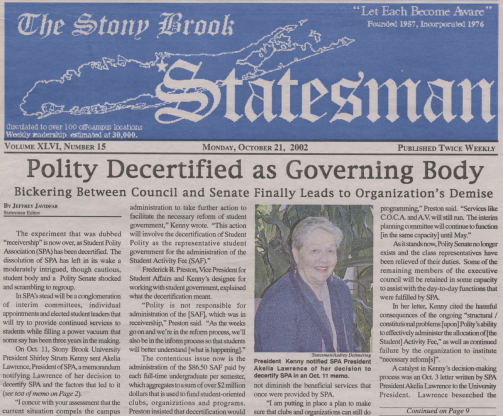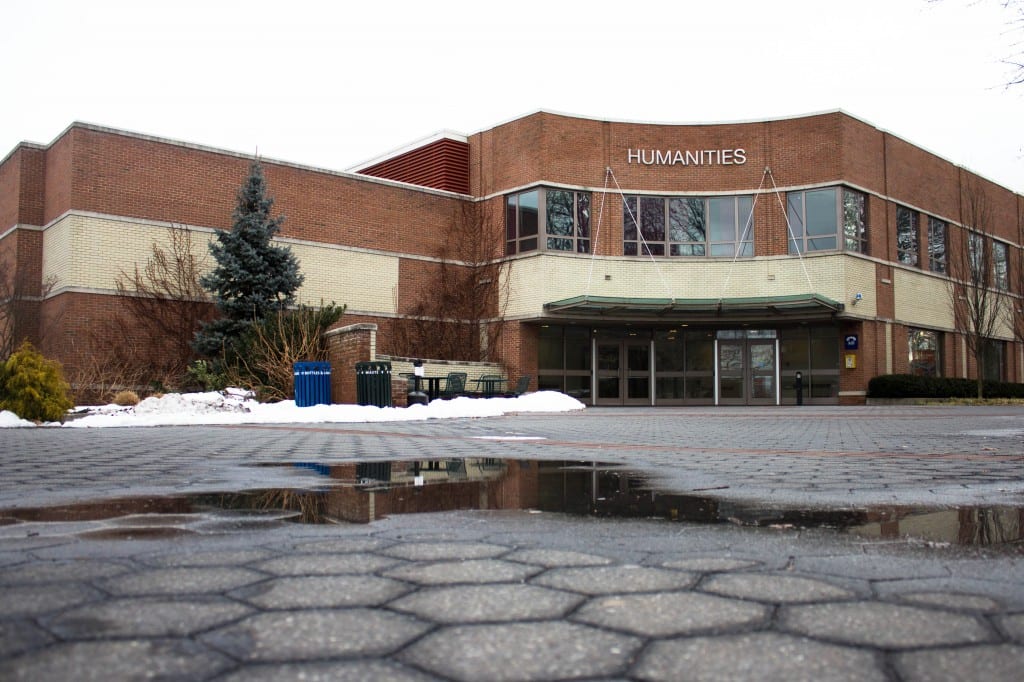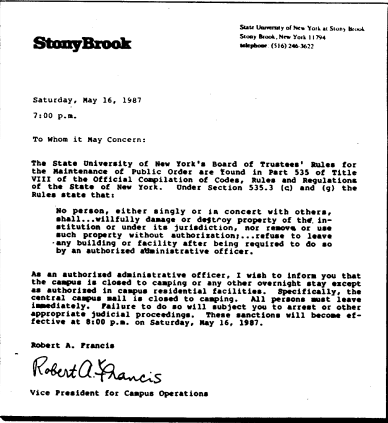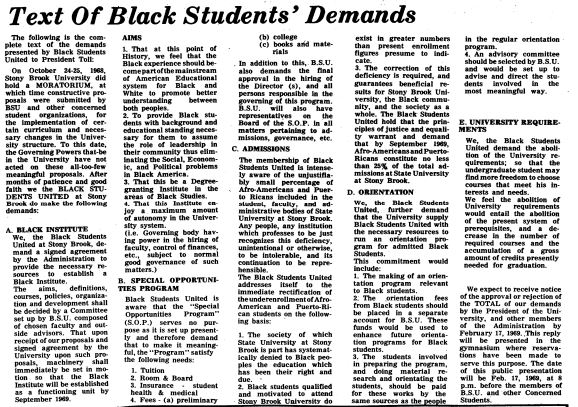
Originally published on Oct. 21, 2002
The experiment that was dubbed “receivership” is now over, as Student Polity Association (SPA) has been decertified. The dissolution of SPA has left in its wake a moderately intrigued, though cautious, student body and a Polity Senate shocked and scrambling to regroup.
In SPA’s stead will be a conglomeration of interim committees, individual appointments and elected student leaders that will try to provide continued services to students while filling a power vacuum that some say has been three years in the making.
On Oct. 11, Stony Brook University President Shirley Strum Kenny sent Akelia Lawrence, president of SPA, a memorandum notifying Lawrence of her decision to decertify SPA and the factors that led to it.
“I concur with your assessment that the current situation compels the campus administration to take further action to facilitate the necessary reform of student government,” Kenny wrote. “This action will involve the decertification of Student Polity as the representative student government for the administration of the Student Activity Fee (SAF).”
Frederick R. Preston, Vice President for Student Affairs and Kenny’s designee for working with student government, explained what the decertification meant.
“Polity is not responsible for administration of the [SAF], which was in receivership,” Preston said. “As the weeks go on and we’re in the reform process, we will also be in the inform process so that students will better understand [what is happening].”
The contentious issue now Is the administration of the $86.50 SAF paid by each full-time undergraduate per semester, which aggregates to a sum of over $2 million that is used to fund student-oriented clubs, organizations and programs. Preston insisted that decertification would not diminish the beneficial services that once were provided by SPA.
“I am putting in place a plan to make sure that clubs and organizations can still do programming,” Preston said. “Services like C.O.C.A. and A. V. will still run. The interim planning committee will continue to function [in the same capacity] until May.”
As it stands now, Polity Senate no longer exists and the class representatives have been relieved of their duties. Some of the remaining members of the executive council will be retained in some capacity to assist with the day-to-day functions that were fulfilled by SPA.
In her letter, Kenny cited the harmful consequences of the ongoing “structural/constitutional problems [upon] Polity’s ability to effectively administer the allocation of [the Student] Activity Fee,” as well as continued failure by the organization to institute “necessary reform[s]”.
A catalyst in Kenny’s decision-making process was an Oct. 3 letter written by SPA President Akelia Lawrence to the University President. Lawrence beseeched the “Administration to take whatever steps were necessary… to remove the negative forces,” from student government claiming to be “out of options and very tired [of] trying to make a dysfunctional government function.”
Senators, particularly those in the Commuter Student Association, were clearly surprised by Lawrence’s letter and Kenny’s subsequent decision. Most refused to comment formally, but they were indignant about the situation and reviewed the letter as a devious move by the Executive Council. CSA President Mike Bernardin, a Polity Senator, agreed to go on the record.
“[Lawrence]’s letter completely misrepresented Senate,” Bernardin said. “Basically, Senate runs flawlessly when council is not there… I see [the letter] as an underhanded move by Council because it was done with the knowledge of [the] Senate.”
But Bernardin said that while he was upset at the current circumstances, he was looking forward. “At this point all I can do is look into how it came about and hope for a chance to be part of the new student government when it is formed.”
The Senate’s failure to adequately amend its constitution was widely seen as the major impetus for decertification. The version of the document that the Senate sent to the Executive Council contained long-standing redundancies that were supposed to have been rectified in the amending process, and allegedly advantaged the Senate in relation to Council. The amending process itself was marred by disorderly conduct and general confusion regarding procedural rules.
“What I did see at the meeting was a total disregard for governance,” Preston said of one October meeting.
The SPA Senate met last Wednesday, as it turns out unofficially, and voted to have Lawrence sign an affidavit confirming that she had indeed written the Oct. 3 letter that was sent to Kenny. A member of Senate had obtained the correspondence and read the contents into the minutes earlier in the meeting.
Some members of the Senate questioned the legality of the administration’s actions. But administrators stated that after consulting extensively with legal counsel, they were quite confident about their action to decertify the current student government.
“I have talked to legal counsel on this campus and in Albany,” Preston said. “Outside of the [SAF] there is no references to a student body.”
In the SUNY guidelines, reference to a student governing body is made only in association with the administration of the SAF. Once this budgetary power is removed from a governing body, that organization loses all authority and legitimacy. It should be duly noted that the guidelines make no mention of a student senate.
“I don’t think this University would do something illegal. I know it wouldn’t,” said Alexandra Duggan of the Dean of Students Office. “If something is not working, it needs to be fixed.”
Kelly Brown contributed to this article.













